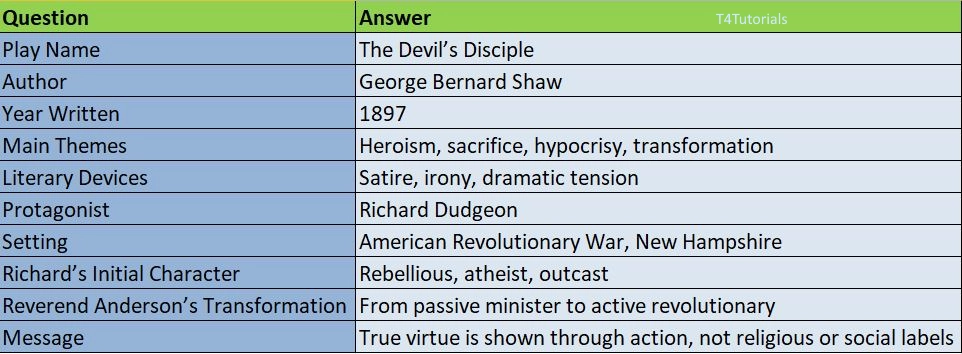Summary:
The Devil’s Disciple is a play written by George Bernard Shaw in 1897. It is set during the American Revolutionary War (1775–1783) and follows the story of Richard Dudgeon, a self-proclaimed “devil’s disciple”, who undergoes a transformation from a rebellious outcast to a selfless hero. The play takes place in New Hampshire, where the British army is trying to suppress the American rebellion. Richard, known for his atheism and defiance of societal norms, unexpectedly sacrifices himself when British soldiers mistake him for Reverend Anthony Anderson, a peaceful minister. Rather than correcting them, Richard chooses to face execution, demonstrating true courage and selflessness. However, he is ultimately saved when Anderson, inspired by Richard’s bravery, takes action against the British. The play explores themes of heroism, sacrifice, hypocrisy, and transformation. Shaw contrasts true virtue with religious hypocrisy, suggesting that actions define morality more than words. Richard, though considered a “devil’s disciple,” proves to be the most noble character in the story.
10
Score: 0
Attempted: 0/10
Subscribe
| Question | Answer |
| Play Name | The Devil’s Disciple |
| Author | George Bernard Shaw |
| Year Written | 1897 |
| Main Themes | Heroism, sacrifice, hypocrisy, transformation |
| Literary Devices | Satire, irony, dramatic tension |
| Protagonist | Richard Dudgeon |
| Setting | American Revolutionary War, New Hampshire |
| Richard’s Initial Character | Rebellious, atheist, outcast |
| Reverend Anderson’s Transformation | From passive minister to active revolutionary |
| Message | True virtue is shown through action, not religious or social labels |